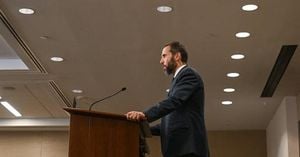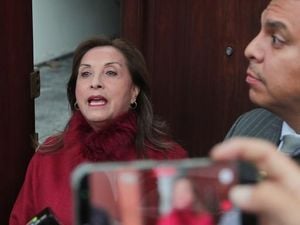The political landscape in the United States and abroad has rarely felt as tumultuous as it does in August 2025. At the heart of the latest storm is Zohran Mamdani, the Muslim candidate for New York City mayor, who has found himself at the center of a fierce and very public clash with former President Donald Trump and leading Republicans. Over the past month, the rhetoric has escalated, with Trump leveling personal attacks, issuing threats, and even making the unusual move of endorsing Democrat Andrew Cuomo in the mayoral race. Meanwhile, Trump’s international stance remains equally volatile, as he weighs a major decision on Ukraine’s ongoing war with Russia, dangling the threat of massive sanctions—or possibly, inaction—over the heads of world leaders.
On August 24, 2025, the tension in New York City politics reached a fever pitch. According to multiple reports, including coverage from The Hindustan Times, Trump openly called Mamdani a "communist lunatic" and threatened to have him arrested, claiming Mamdani posed a threat to the city. The attack wasn’t an isolated moment of political theater; it was part of a sustained barrage from Trump and his allies. Over the preceding weeks, Mamdani had faced repeated threats and warnings, not only from Trump but also from former Immigration and Customs Enforcement Director Tom Homan. In one particularly pointed remark, Homan declared, "We're coming," a statement widely interpreted as a warning to Mamdani following his public clashes with Trump.
The former president’s language has been nothing short of incendiary. Referring to Mamdani as a "terrible-looking lunatic" and a "communist," Trump has not held back. He went so far as to say, "We don’t need a communist in the U.S.," a statement that, as reported by NDTV, was accompanied by threats of deportation and arrest. For his part, Mamdani has not shied away from the confrontation. In a direct response to Trump’s threats, Mamdani said, "I refuse to be intimidated by threats or bigotry. This is not Trump’s audition. New Yorkers deserve better than fear-mongering from a former president who doesn’t even live here."
The stakes in the New York mayoral race have only grown higher as Trump’s involvement has deepened. In a move that surprised many, Trump publicly endorsed Democrat Andrew Cuomo, bypassing Republican candidates altogether. This endorsement, reported by multiple outlets including The Hindustan Times, has left political observers scratching their heads. Was Trump’s support for Cuomo a strategic maneuver to block Mamdani, whom he views as a radical threat, or a calculated risk to sow chaos within the Democratic Party? The answer, as with so much in the Trump era, remains unclear.
But the drama isn’t confined to New York City. As the mayoral battle raged, Trump’s attention also turned to the international stage, where the war in Ukraine continues to dominate headlines and diplomatic calendars. On August 22, 2025, Trump announced that he would make an "important" decision in two weeks regarding U.S. policy on Ukraine. This decision, he said, would depend on whether Russian President Vladimir Putin and Ukrainian President Volodymyr Zelensky could be persuaded to meet face-to-face.
"I think I'll know. I think I'll know the attitude of Russia, and, frankly, of Ukraine. It takes two," Trump told reporters in the Oval Office, according to AFP. He elaborated on the possible outcomes, stating, "Then I'm going to make a decision as to what we do and it's going to be a very important decision. That's whether or not it's massive sanctions or massive tariffs or both. Or do we do nothing and say it's your fight."
Trump’s comments came in the wake of a Russian strike on a U.S.-owned factory in Ukraine on August 21, 2025—an incident that clearly angered the president. "I'm not happy about a Russian strike that hit a US-owned factory in Ukraine, and I'm not happy about anything having to do with that war," he said. Yet, despite his frustration, Trump emphasized that a solution would require cooperation between Putin and Zelensky, likening their relationship to mixing "oil and vinegar." "We're going to see if Putin and Zelensky will be working together. You know, it's like oil and vinegar, a little bit. They don't get along too well, for obvious reasons," he remarked, adding a touch of levity to an otherwise grave situation.
The prospect of a Putin-Zelensky summit, however, appears remote. As of August 22, 2025, Russian officials had ruled out an immediate meeting with Zelensky, dashing hopes that direct talks might pave the way for peace. Trump, for his part, suggested he might attend such a summit if it ever materializes, but left the door open to a range of outcomes—including, notably, doing nothing at all. "We'll see," he said, his signature ambiguity leaving allies and adversaries alike guessing.
Trump’s approach to both domestic and international crises has been characterized by unpredictability and a willingness to break with convention. His threat to arrest Mamdani and his endorsement of Cuomo have upended traditional political alliances in New York, while his two-week ultimatum on Ukraine has introduced fresh uncertainty into an already volatile conflict. Observers note that Trump has a history of setting deadlines—often in two-week increments—that come and go without resolution. Whether this latest pronouncement will yield concrete action or fade into the background remains to be seen.
Meanwhile, the atmosphere in New York is tense. Mamdani’s supporters have rallied behind him, denouncing what they see as a campaign of intimidation and bigotry. Civil rights groups have condemned Trump’s rhetoric, warning that it could inflame tensions in a city already grappling with rising hate crimes and political polarization. Andrew Cuomo, for his part, has remained relatively quiet about Trump’s endorsement, perhaps wary of alienating voters on either side of the political divide.
Nationally, the debate over Trump’s handling of Ukraine has exposed deep divisions. Some lawmakers argue that a tough stance—up to and including "massive sanctions"—is necessary to deter further Russian aggression. Others, however, fear that Trump’s unpredictability and mixed signals could undermine U.S. credibility and embolden adversaries. The lack of a clear, consistent policy has left allies in Europe and Ukraine anxious about what the next two weeks might bring.
As the summer of 2025 draws to a close, both New York City and the world stage are waiting for answers. In the mayoral race, the question is whether Mamdani can withstand the onslaught from Trump and his allies, or if Cuomo’s campaign will benefit from the former president’s surprise support. In Ukraine, the fate of peace talks—and the possibility of American intervention—hangs in the balance, with Trump’s self-imposed deadline fast approaching.
One thing is clear: in an era defined by uncertainty and upheaval, the only constant is the unexpected. Whether in the streets of New York or the battlefields of Ukraine, the next chapter is sure to be written in bold, unpredictable strokes.



